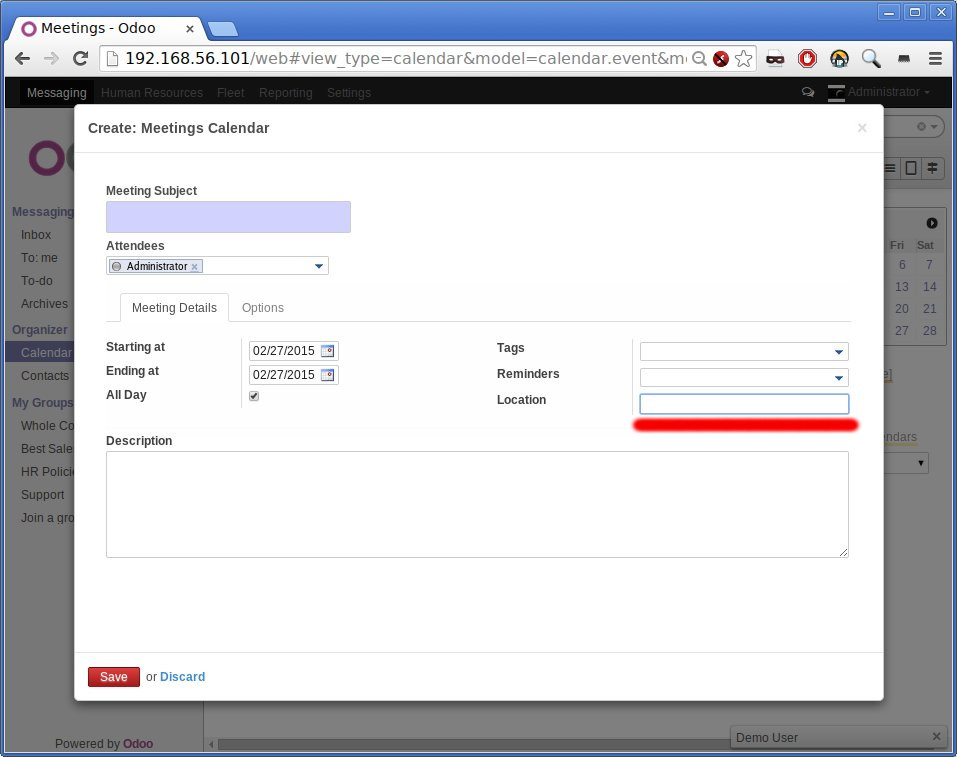ODOO evaluation
13 feb 2015
motivation
i’ve been looking into various open source ERP systems on [1] and started with odoo version 8.0.
odoo
the ERP i’m searching for must fulfill the following requirements:
- html5 interface (with great usbility)
- API for automated unit testing
things i want to realise with it:
- payment (accounting)
- address database for customers
- room management
- hosting data for creating a catalogue
- statistics
- data import (from previous ERP)
what i liked
at first glance:
- pure html5 interface on the client (there is xmlrpc [4] for scripting!)
- nice, clean and modern interface
- written in python
- they use git and github.com
- they use postgresql
- easy to install
- documentation [4] and [5] seems to be well done
- like the ‘as a question’ [6] which reminds me of stackoverflow
what i disliked
at first glance:
odoo use long-polling (not websockets) for the internal chat. all other modules i tried lack support for such transparent updates. this includes:
- calendar
- messaging
- fleet management
- human resources
- sales
this is hard to accept for me! webdesign from the 80ties! but compared to ‘apache ofbiz’ it seems pretty modern. anyway i hate systems which force me to press F5 when something changed! this is annoying, especially in the fleet management where you have to click the drop down to see all data after each F5.
calendar
lacks room management?!
no REST interface
removing of optional components broke the interface by leaving menus which just won’t do anything (experienced with installing/removing the fleed module)
the installation for the ubuntu 14.04 [3] was incomplete:
- python-pypdf was missing
- python-passlib was missing
thus incomplete dependencies! as a result the initial database deployment was corrupted and it took me quite a while until i realised i had to remove the database first and then restart the daemon afterwards which then recreated the db successfully. one solution would be to use nix on nixos!
using
./odoo.py scraffoldd openacademy addonsdoes not have any effect, as the scraffoldd is accidentaly written with two d but ./odoo.py does not report any error!
conclusion
i got mixed feelings about this project product:
- nice html5 interface which at first glance seems good but requires manual refresh -> ugly!
- i need to implement my own module [5] to experience the API is well designed
- don’t like the odoo marketing (too much design and fuss)
- need to look into optional modules, but installing them is not straight forward ;P
my overall impression is rather positive.
links
- [1] https://en.wikipedia.org/wiki/List_of_ERP_software_packages
- [2] https://www.odoo.com/
- [3] https://www.techreceptives.com/install-odoo-v8-ubuntu-14-04-lts/
- [4] https://www.odoo.com/documentation/8.0/api_integration.html#calling-methods
- [5] https://www.odoo.com/documentation/8.0/howtos/backend.html
- [6] https://www.odoo.com/forum/help-1/question/are-the-translation-language-files-finished-for-odoo-v8-updated-9-feb-2015-64234


